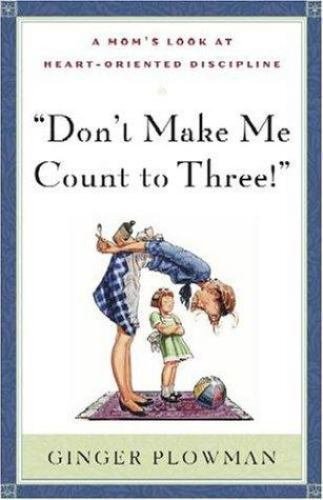
I don’t know where I heard about this “Don’t Make Me Count to Three!”. It might have been from one of you, or maybe someone at my church told me about it, or maybe I read about it on someone’s blog. I wish I could remember, because I’d like to thank that person! This book has now become one of my my favorite parenting books ever. Yup, it’s that good!
First, I love this book because it makes me laugh! Author Ginger Plowman has quite a gift of combining common-sense instruction with humor.
“The wise in heart are called discerning,
and pleasant words promote instruction” (Proverbs 16:21).
The introduction to her book contains an excellent overview of wisdom and how to implant it in the heart of your child. She explains that we must reach the heart of our children if we’re going to instruct them in righteousness. She then shows us how only God’s Word can reach our children’s hearts.
“All Scripture is God-breathed and is useful for teaching, rebuking, correcting and training in righteousness, so that the man of God may be thoroughly equipped for every good work” (2 Timothy 3:16-17).
For the majority of her book, she gives practical ways to actually train our children in righteousness, reaching their hearts with God’s Word. She bases her book solidly upon Scripture, using Proverbs 29:15 as her key verse.
“The rod and reproof give wisdom: but a child left to himself bringeth his mother to shame” (Proverbs 29:15, KJV).
In the first part, she explains what a biblical “reproof” is and gives practical guidelines on how to verbally correct our children.
For instance, she explains how reproof is different from a scolding. Scolding is usually done in anger, based on human reasoning. Reproof is done with self control, based on God’s reasoning from Scripture.
She quotes H. Clay Trumbull, who wrote about the dangers of scolding way back in 1891:
Scolding is, in fact, never in order, in dealing with a child, or any other duty in life. To “scold” is to assail or revile with boisterous speech… Scolding is always an expression of a bad spirit and of a loss of temper…
If a child has done wrong, a child needs talking to; but no parent ought to talk to a child while that parent is unable to talk in a natural tone of voice, and with carefully measured words. If the parent is tempted to speak rapidly, or to multiply words without stopping to weigh them, or to show an excited state of feeling, the parent’s first duty is to gain entire self-control. Until that control is secured, there is no use of the parent’s trying to attempt any measure of child training. The loss of self-control is for the time being an utter loss of the power for the control of others….
If, indeed, scolding has any good effect at all, that effect is on the scolder, and not the scolded. Scolding is the outburst of strong feeling that struggles for the mastery under the pressure of some outside provocation. It never benefits the one against whom it is directed, nor yet those who are its outside observers, however, it may give physical relief to the one who indulges in it. If, therefore, scolding is an unavoidable necessity on the part of any parent, let that parent at once shut himself, or herself, up, all alone, in a room where the scolding can be indulged in without harming anyone. But let it be remembered that, as an element in child training, scolding is never, never in order.
Isn’t that great? What’s even better is that she tells us what to do instead of angrily scolding our children!
In the final part of the book, she tells us how to use the rod to discipline our children. Hers is the best treatment of this controversial subject I’ve ever read! She examines common arguments against spanking. She also examines some “worldly” methods of discipline that are used in place of the rod, showing what the Bible says about them and why they really don’t work. Finally, she shares what does work!
Funny, practical, and completely doused in Scripture! This is truly an excellent book!
![]()
Leave a Reply